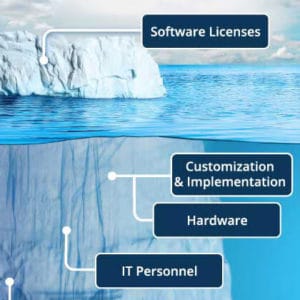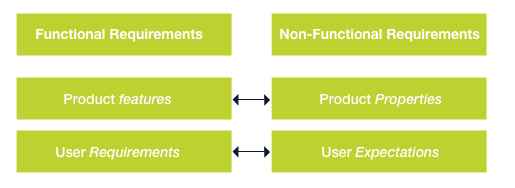What is Brightpearl?
Before weighing up the pros and cons of some Brightpearl alternatives, it’s important to understand what Brightpearl is and what it does differently.
Unlike your standard order management systems, Brightpearl is a fully comprehensive cloud-based retail operating system, built for the omnichannel world.
That means Brightpearl provides the infrastructure that omnichannel merchants need to automate their post-purchase operations, including inventory and sales order management, order fulfillment and shipping, warehouse management, accounting, POS, reporting, customer relationship management (CRM), business intelligence, and much more.
Plus, Brightpearl provides great flexibility and scalability. This means you can easily add on any best-in-breed software for each area of the business, and build your unique tech stack for growth.
And here’s how.
With Brightpearl you can:
- Have native high performance connectors to all the leading ecommerce platforms and marketplaces, such as Shopify, BigCommerce, Magento, Amazon and eBay
- Manage multi-location inventory with ease
- Perform data-driven inventory forecasting based on critical KPIs
- Simplify and speed up complex order fulfillment workflows, from dropshipping to partial fulfillment and multi-location fulfillment with easy to set up automation rules
- Have an accurate view of your orders in one place. Generate data-led, real-time reports and analytics
- Automate your accounts management and bookkeeping
- Gain a full view of your customers order history and interactions with your business
- Experience efficient implementation carried out by our in-house experts
- Get tailored onboarding training as well as 24/7 technical support
- Have a dedicated Customer Success Manager who will provide you with best practices to optimize your operational workflows
If your brand’s looking for growth and scalability, Brightpearl is a great choice and will allow you to operate seamlessly across multiple online and physical stores. That being said, it’s always a good idea to get a grasp of other options.
And if that’s the case, it’s worth having a look at some Brightpearl competitors. To make your search that bit more straightforward, we’ve put together a list of five Brightpearl alternatives. But before we dive into that, let’s talk strategy and how to choose the right Brightpearl alternative for your business.
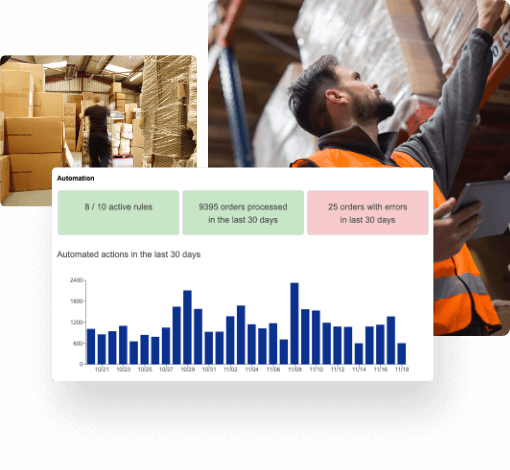
How to choose the right Brightpearl alternative for your business
Let the comparison begin!
It’s time to scour the market for the best Brightpearl alternative out there. But what should you be looking for?
When picking software it’s important to consider:
- How much flexibility and scalability you want for your business,
- The additional services included with or offered alongside the software,
- The integrations offered, and of course,
- The price.
You don’t want too many—or any—hidden and unexpected fees later on. So, all said and done, here are our top seven search criteria unpacked.
1. Pick your category
First thing’s first, pick your category. Most Brightpearl alternatives fall into two distinct categories.
The first category consists of classic Enterprise Resource Planning tools (ERPs). These are the likes of Netsuite and Acumatica. These tools are one-size-fits-all solutions designed for businesses across niches—they’re not retail-specific. That means customizations are usually needed to meet merchants’ omnichannel selling requirements. They’re likely, too, to include features and elements which retail businesses simply don’t need, but are reflected in the price
Our second category consists of standalone order management systems (OMS). These software tools are designed specifically for simple order management and processing, so lack some of the more robust features that merchants need when growing their businesses.
It’s important to think carefully about what type of back-office system is right for you. And remember to think about the future as well as the present moment.
2. Define your business & its scope
If your business is currently scaling, it’ll be an added challenge to change your systems after just a few months or years. Instead, it’s better to choose software that can grow with you, and sustain your growth projections and aspirations.
So, ensure that you have a clear idea of your business’s scope for the future and apply this as a key criterion when shopping around for software solutions.
3. Determine if the pricing is right for your business
Different software comes in at varying price points, depending on the number of additional features and capabilities. As such, you’ll have to weigh up your investment.
Which features are utterly essential, and which could you easily go without? Which software offers the best features for the money? Do they have a clear scope of your project before the contract is signed to avoid any extra cost? Which services are covered in the package?
These are all hugely important questions to ask yourself whilst comparing Brightpearl alternatives.
4. Check for hidden fees
When calculating the cost of a new software tool, the upfront price is not all you need to consider. It’s extremely important to be aware of any hidden fees. Sometimes, to access the full functionality of an ERP, for instance, you will need to pay extra.
Quite often these extra fees are hidden behind software customizations and extra support hours. For example, you might need to build ecommerce integrations at extra cost, or pay for direct support.
You might find that these integrations are fundamental to your sales management process and end up having to pay out much more than you bargained for.
Image: The Network Effect
5. Check if integrations are pre-built
Always check if integrations are pre-built by the vendor, require individual customization, or come from third-party providers. This might not only impact the price, but also the performance, support and security level of each integration. Third party connectors typically don’t provide direct support.
Indirect or third-party integrations have a tendency to become glitchy. Plus, they’ll be serviced by another organization, so make sure to check out their integration policy and APIs in case you ever need an out-of-the-box integration in the future.
6. Check for flexibility & scalability
Remember, your business tools need to offer longevity. As a scaling business, you’re constantly growing and aiming towards the next big thing. That means your levels of demand and the types of functionalities you’ll need are likely to become more complex over time.
Plus, the world of ecommerce is evolving fast, so you need to make sure that your operating system allows you to stay flexible and easily adjust to the ever-changing market.
7. Check the non-functionals
Non-functionals refer to all of the services sold alongside a software tool. That could include implementation, onboarding training, support, and customer success management. These non-functionals are extremely important.
They are what determine how efficiently your software will work for you or simply if the software will work. According to Gartner, ERP implementation failure rates are between 50% – 75%. In fact, you might go as far as to say that non-functionals are just as important as the software itself.
So don’t neglect these essential features during your search. They have a direct influence on your long-term success. If any process (whether that be implementation or onboarding) is out of whack, then your software just won’t perform as you need it to.
Image: ReQtest
Here are some essential criteria to consider when it comes to the non-functionals:
-
Implementation
Look for a software provider who offers implementations managed and executed by experienced consultants. With Brightpearl, for example, all consultants are bonafide implementation experts.
Also, it’s important to make sure that your project is carefully established in detail before the contract is signed. This ensures the software can meet your requirements and gives you a clear picture of the costs and timelines. The implementation is critical to your software performance and your long-term partnership with the chosen software vendor.
-
Onboarding training
Look for providers that provide designated onboarding training as standard. It doesn’t matter whether the training is in-person or online. Just make sure you’ll receive tailored training for your business. At Brightpearl, retail operations experts will ensure you and your staff are fully trained before your account goes live. You’ll also have access to the self-learning platform for on-demand training.
-
Customer success
Your service provider should be backing you up with a customer success team to help keep your business on the path to success. The customer success team can help you understand all of the resources that are available to you. With Brightpearl, each business also benefits from an assigned account manager to help with contracts, billing, invoicing, and financial management.
-
Support
Support is one of the most important services you want to be looking out for. Many OMSs don’t offer 24/7 support services, while traditional ERP vendors may charge extra money for direct support. Whichever provider you end up choosing, make sure that they offer plenty of high-quality direct customer support. It’s worth checking out some user reviews to be sure of this. Brightpearl, for example, offers unlimited phone and email support as standard.
5 best Brightpearl alternatives for your ecommerce business
The moment we’ve all been waiting for has arrived. We’ve collated our top five Brightpearl alternatives to help you tally up your own comparison.
We’ll be comparing the various options based on price and functionality, among other considerations, to help you make a smart choice for your business.
1. NetSuite
The first one on the list is NetSuite, a one-size-fits-all ERP software solution. The best thing about NetSuite is that it has versatile features, and is compatible with mobile devices (including Android and iOS).
However, unlike Brightpearl, NetSuite is not designed for retail and wholesale. This means, the more your business grows, the more likely you’ll have to build customizations to adapt to your business model. For instance, when you’re adopting a DTC channel, NetSuite is also known to come with a high learning curve and you probably need an in-house developer to help you configure and maintain the system. So you may not be as agile as you want to be in your operations and business growth.
2. QuickBooks Commerce
Formerly known as TradeGecko, QuickBooks Commerce is a cloud-based retail management system that focuses primarily on inventory management, order processing, and supply chain management for B2B businesses.
It completes with a suite of financial, payment, reporting, and accounting tools aimed at helping businesses grow and scale over time. The main selling point is the affordable price of licensing.
However, it’s important to note that QuickBooks Commerce does not support any POS integrations. As such, for retailers with physical as well as online stores, this is not an ideal option.
QuickBooks’ software, too, offers less advanced features than Brightpearl, especially when it comes to customizable workflow automation. However, it’s important to consider that QuickBooks Ecommerce focuses on B2B businesses. Which is hardly ideal for B2C retailers!
3. Stitch Labs
Stitch Labs is a cloud-based retail management platform specifically designed to support multichannel operations. Arguably its best feature is Stitch Labs’ unlimited user quota, which allows an unlimited amount of growth.
Stitch Labs also offers some unique features including estimating, mail order, electronic submission, and approval process control. However, unlike Brightpearl, Stitch Labs does not feature an inbuilt POS system. For point-of-sale functionality, you’ll have to integrate with third-party platforms.
Most pertinent of all, though, is the fact that Stitch Labs will bow out in June 2021. If you don’t want to face another onerous migration of all your systems in just a few months time, you’re better off choosing a solution like Brightpearl.
4. Multiorders
Multiorders is another OMS suitable only for small businesses with straightforward workflows. With Multiorders you can integrate your sales channels and manage orders and shipping. Some good features include the ability to connect shipping carriers, print labels and barcodes, and manage stock levels and pricing.
However, for those businesses with substantial growth forecasts in the near future, Multiorders is likely to come up short. When you want to expand your business in a year’s time it’ll be too time consuming to once again go through the whole software evaluation and implementation process. When planning for the future, it’s better to consider more robust software options like Brightpearl that will be able to support more complex operations.
5. Sellbrite
Sellbrite is a small order management software tool suitable for businesses that need a quick solution to manage simple order processing workflows. Sellbrite’s main selling point lies in features including SEO management, customizable templates, serial number tracking, and product catalogs.
However, Sellbrite is limited in its capacity. Businesses forecasting substantial growth over the next 12-24 months are better off investing in a flexible operating system like Brightpearl. Brightpearl can automate and simplify the complex post-purchase operation workflows you’ll need as your business grows and develops.
Why Brightpearl is the right solution for your business
Brightpearl is one of the top 250 fastest growing SaaS companies, according to Latka.1
And here’s why.
Brightpearl offers advanced features that support complex order processing workflows as your business expands. Brightpearl also offers a fully integrated retail technology ecosystem for growing businesses.
Besides, we are proud of our intuitive yet powerful Automation Engine that saves merchants on average 2 months a year by automating their critical operational workflows.
Snap Supply is one of Brightpearl’s many success stories. This appliance parts specialist has been able to save a whopping 240 hours a month since switching to Brightpearl. They’ve since tripled their profits and grown 5-10% each month since implementation.2
And that’s because at the heart of it, here at Brightpearl, we take our services seriously.
1 Brightpearl Makes Latka 250 Fastest Growing SaaS Company List – Brightpearl (2021). Available at: https://www.brightpearl.com/blog/brightpearl-makes-latka-250-fastest-growing-saas-company-list (Accessed: 5 May 2021).
2 Snap Supply – Brightpearl (2021). Available at: https://www.brightpearl.com/customer-stories/snap-supply (Accessed: 5 May 2021).
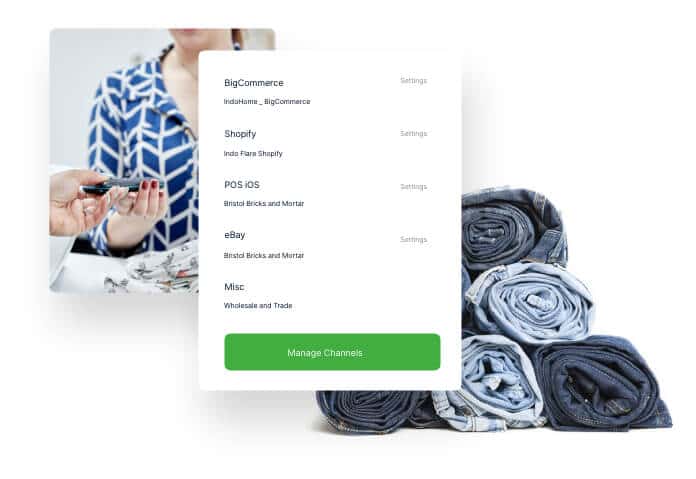
Tailored to retail and wholesale
Brightpearl offers essential functionality for retail and wholesale businesses, allowing you to shift your business model easily.
Our experts are always keeping a close eye on the retail and wholesale sectors to ensure that our products can evolve in a timely manner with current trends. Plus, we’re specifically designed for retail so you’ll never have to fork out for unnecessary functionalities or account busting customizations (like you would with a “one-size-fits-all” ERP).
Scalable retail operation system
Brightpearl is seriously scalable thanks to a great integration partner ecxosystem and API. With Brightpearl’s agile operations, businesses can scale to their heart’s content, safe in the knowledge that Brightpearl can manage tens of thousands of orders a day.
Customer service done right
Customer service is taken seriously at Brightpearl. That means in-house retail consultants to support every partnership with robust project management, scoping, implementation, onboarding training, 24/7 support and ongoing business consulting. Plus, an on-demand self-learning platform at your disposal at all times.
An intuitive yet powerful automation engine
Thanks to Brightpearl’s powerful automation engine, multi-location fulfillment operations like order routing, splitting, backorders, and dropshipping can be easily automated based on your business’s unique needs.
Meaning? You can get your orders sent out faster, and spend more time focussed on growing your business. Brightpearl’s pre-built automation conditions create fully-tailored automated rules for your unique business workflows.
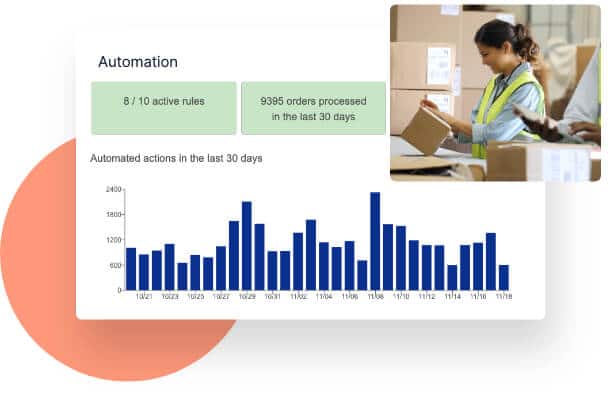
Who will you pick?
You’re ready to equip your business with the tools it needs to succeed. Whatever your business needs, we hope you find the right software tool for you.
Just remember to recap our seven essential criteria—software category, business scope optimization, pricing, hidden fees, integrations, scalability, and those all-important non-functionals.
When you do, we think you’ll want to find out more about how Brightpearl can help take your company to the next level.

